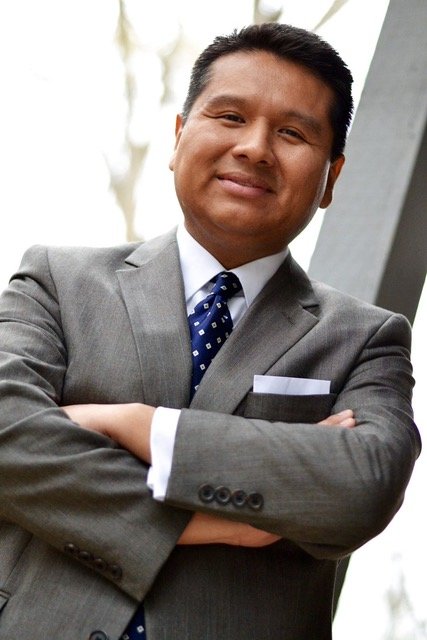 A native of Peru who holds dual citizenship in the United States, Javier Chavez went to school at Lee University and Wheaton College before being a pastor and church planter in his home country for 13 years. In 2014 he returned to the U.S. and a year later launched Amistad Cristiana Gainesville. Last month, he became the first Hispanic Georgia Baptist named to the SBC Committee on Committees, where he'll serve alongside Truett-McConnell University President Emir Caner. AMISTAD CRISTIANA/Special
A native of Peru who holds dual citizenship in the United States, Javier Chavez went to school at Lee University and Wheaton College before being a pastor and church planter in his home country for 13 years. In 2014 he returned to the U.S. and a year later launched Amistad Cristiana Gainesville. Last month, he became the first Hispanic Georgia Baptist named to the SBC Committee on Committees, where he'll serve alongside Truett-McConnell University President Emir Caner. AMISTAD CRISTIANA/SpecialGAINESVILLE — It makes perfect sense that Javier Chavez was dedicating another church in Peru last month upon receiving word of his selection to the SBC Committee on Committees. In making the decision, SBC President Steve Gaines made Chavez the first Hispanic Georgia Baptist to hold that position.
Planting churches has been in Chavez’s DNA since he was a youngster, after all. His father Maximo, also a church planter, used to take young Javier throughout Central America on trips to the new congregations. Born in Peru, the Chavez family would go on to live in Costa Rica, Panama, and Argentina.
Those experiences developed a sense of “mandatory” evangelism, as Chavez, senior pastor of Amistad Cristiana Gainesville, describes it.
“My father showed me the need to preach Christ at all times and in all places,” he says. “With him, I learned to share my faith on a bus, on a plane, in a park, in the streets or an office, with the rich or poor.
“He said to me and my brothers, ‘Christ gave His life for us, so we must give ours for him.”
That life dedicated to ministry led to college at Lee University in Cleveland, TN and then to Wheaton College in Chicago for graduate school. At the latter, he met his wife Noelia.
Plans were to earn his doctorate at Princeton. However, the couple answered what that they was a one-year commitment to missions.
“I shared with my wife how exciting it would be for us to live in Peru for a year serving families and sharing Christ. She had never been to South America before, but was up to the challenge,” explained Chavez, who holds dual citizenship in the United States and Peru.
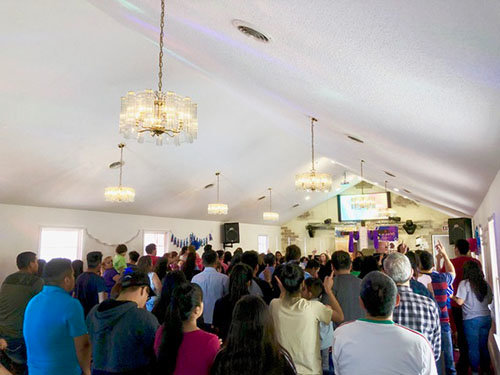 About half the congregation at Amistad Cristiana Gainesville consists of children and teenagers, estimates Senior Pastor Javier Chavez. AMISTAD CRISTIANA/Special
About half the congregation at Amistad Cristiana Gainesville consists of children and teenagers, estimates Senior Pastor Javier Chavez. AMISTAD CRISTIANA/SpecialThe one-year commitment, it turns out, became 13. Arriving with two bags and $200 between them, the Chavezes started a house church, Amistad Cristiana Lima. The church kept growing, first moving to a garage then a hotel auditorium before constructing the building where it remains today. Along the way Noelia established “The Abigail Project,” an after-school program that provided education, nutrition, and the gospel for children. That ministry, says her husband, proved key to helping impoverished families.
Along the way Chavez remained determined that Amistad Cristiana would reflect his desire to follow the Great Commission.
“God called me to train leaders for church planting. So, I launched a school of leadership for that purpose. The men who finished the training process went out to plant churches and now the ministry has 15 solid congregations across, with more being planted."
When the Chavez family moved to the U.S. in 2014 Carolos Paredes succeeded Javier as pastor of Amistad Cristiana Lima. Paredes, a businessman and former politician, prayed to receive Christ through Chavez’s ministry in 2010.
“Lives are being saved, baptized, and discipled,” says Chavez.
In the U.S., the family first lived in Los Angeles while Chavez worked on his doctorate before moving to Gainesville. Specifically, they settled in the north Georgia town of Lula.
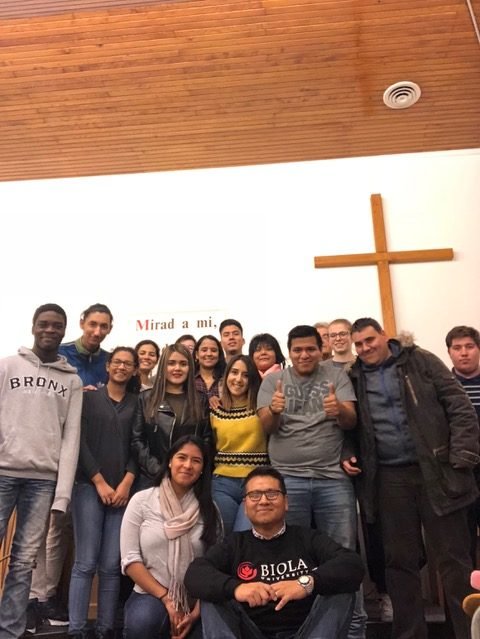 Standing together are a group of Latino college students in Switzerland who prayed to receive Christ through the ministry of Amistad Cristiana. The church's Latin outreach to the European country joins work throughout Central America and in Hidalgo, Mexico as well as Georgia. AMISTAD CRISTIANA/Special
Standing together are a group of Latino college students in Switzerland who prayed to receive Christ through the ministry of Amistad Cristiana. The church's Latin outreach to the European country joins work throughout Central America and in Hidalgo, Mexico as well as Georgia. AMISTAD CRISTIANA/Special“Nothing compares to living here,” he says. “We all have come to love Georgia, the people, and southern food. But most important we love the Southern hospitality and generosity.”
From Gainesville, Chavez launched the umbrella ministry of Amistad Cristiana International in 2015. Currently, it encompasses work in Peru and Gainesville while also planting a church in Hidalgo, Mexico and conducting ministry among Latinos in Geneva, Switzerland.
“Amistad Cristiana Gainesville is a multicultural, bilingual, and dynamic congregation whose only purpose is to preach the Gospel and share Christ as the true solution for our lives,” states Chavez. “We have people from Mexico, El Salvador, Puerto Rico, Honduras, Cuba, and Peru. Our youth and children are American by birth. You will hear Spanish and English frequently in our church. We’ve experienced quick growth because we’re committed to win souls for Christ.”
The church’s name, he points out, reflects its philosophy in relationships.
“In Latin America two words are very important to us – amigo (friend) and familia (family). In fact, Amistad Cristiana means ‘Christian friends’ and any person who comes to our church we strive to make them feel like they're our amigo and part of our familia.”
Chavez credits Lakewood Baptist in Gainesville as “pivotal” in the launch and work of Amistad Cristiana, which also works closely with Chattahoochee Baptist Association and Intercultural Church Planting of the Georgia Baptist Mission Board to further Latino outreach in the area.
Amistad Cristiana is also a cooperating church with #ReachingNextGen, an emphasis through the Georgia Baptist Mission Board to share the gospel with and disciple children and teenagers.
“We’re very excited about the emphasis and I’m here to personally cooperate if needed,” he says. “I support fully our GBC President Mike Stone in his call to reach our next generation. I’m 41 myself and have four children at home. My greatest reward someday will be to see them serve the Lord all of their lives.”
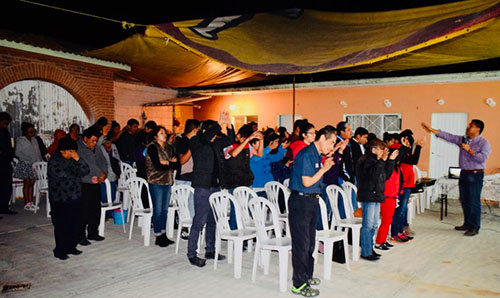 People pray and worship at this service in Hidalgo, Mexico. AMISTAD CRISTIANA/Special
People pray and worship at this service in Hidalgo, Mexico. AMISTAD CRISTIANA/SpecialIn three weeks, Chavez told The Index, Amistad Cristiana will baptize a large group of new believers. “Fifteen of them will be youth,” he adds. “Try and tell me God does not have a plan for them. To Christ be the glory.”
With his church nearly half children and teenagers, Chavez expresses a desire for others to sense what he sees coming in the Latino community.
“The Hispanic population is growing steadily in America and number of Hispanic children and youth rapidly increasing," he says. "This presents the ethnic church in American and Georgia with a new challenge.”
These children and youth fall into two groups, he explains. The “1.5 generation” includes those who came to America as babies and grew up here. The other group, the “2.0 generation,” are children of Latino immigrants born and raised in America.
For these youth, Spanish remains the language spoken by parents at home while English is used in school and with friends. As with other cultures, many students attend church because parents make them. But Chavez insists there’s a different dynamic in play for Hispanic students.
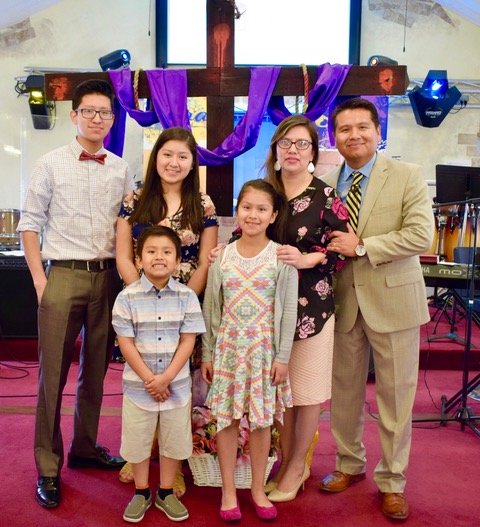 The Chavez family includes Javier and wife, Noelia, as well as children Joshua, Abigail, Vania, and Nathanael. AMISTAD CRISTIANA/Special
The Chavez family includes Javier and wife, Noelia, as well as children Joshua, Abigail, Vania, and Nathanael. AMISTAD CRISTIANA/Special“Once they turn 18 they stop coming to church for various reasons. The church does everything in Spanish and they don’t understand it fully. The pastor can’t have a conversation with them because he himself doesn’t speak English.
"The church has no attractive ministries to offer them or no ministers trained for work with youth, children, collegiate, music, or young adults.”
As a result, any discipleship gains made die quickly. A potential harvest of leaders, missionaries, church planters, and pastors never materializes. That’s why, Chavez declares, his church is investing in the present to make way for the future.
“Amistad Cristiana is raising up a new generation of future leaders and church planters among our 1.5’s and 2.0’s,” he says. “These guys are searching for Hispanic leaders they can understand and serve with as their role models. If we only concentrate on the present church and forget the next generation, we will be in deep trouble in the next few years.
“Personally, I’m very excited to see many of our future denominational leaders come from that generation and lead the greatest revival this nation has yet to see.”